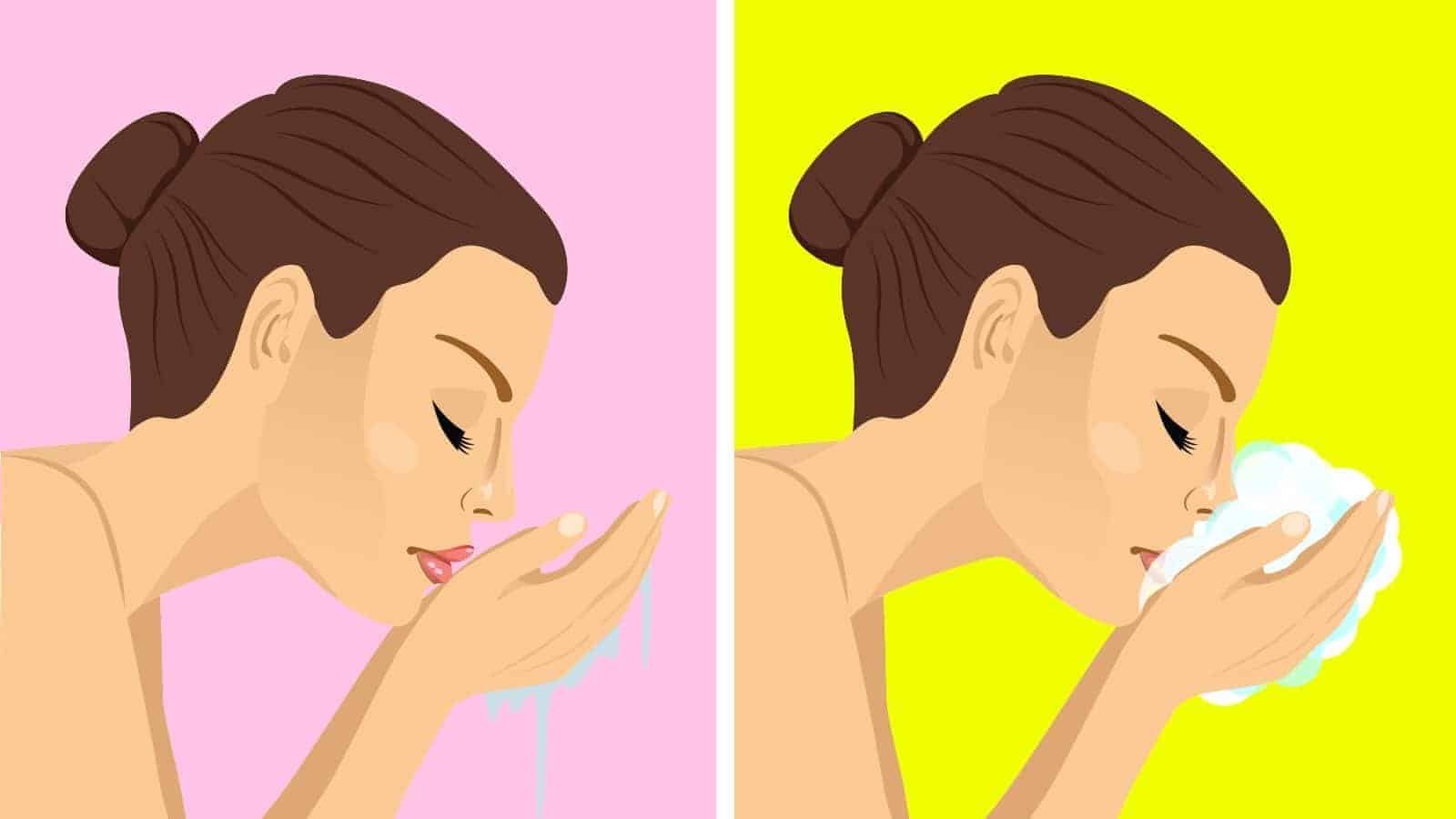In our quest for perfect skin, we often overlook how critical it is to properly wash our face; after all, it doesn’t take long before dirt and makeup can start to clog pores, giving way to breakouts. In some cases, dirt and makeup can even produce bacteria, which is known to cause seborrhoeic dermatitis, a chronic form of eczema. One way to circumvent such problems is to thoroughly wash your face every day. In saying that, however, there is a right and wrong way to go about it. In this article, we will detail the right way to wash your face and also highlight a few common face-washing mistakes in the process.
TOP 4 MISTAKES YOU MAY BE MAKING WHEN WASHING YOUR FACE
Before discussing how to properly wash your face, let’s take a moment to identify some common face-washing mistakes first:
1. NOT WASHING YOUR FACE BEFORE BED
Although it may seem obvious to some, it is critical that you thoroughly wash your face before bed. This fundamental rule applies whether you wear makeup or not, especially since oil and sweat can build up on the outer layer of the skin throughout the day. By not taking a few minutes to remove this buildup, you increase the likelihood of inflammation, acne, and general skin irritation. In fact, the probability of skin irritation increases the longer you go without washing your face.
2. NOT WASHING YOUR FACE IN THE MORNING
Washing your face in the morning is just as important as washing it at night. Making time for that initial cleanse is a great way to start the day; beyond that, it is also an opportune time to wash away dirt, oil, and saliva that may have accumulated on your face while you were sleeping. In doing so, your skin will feel refreshed and, best of all, it will be better prepared to absorb any skin-care product you apply afterward.
3. AVOID EXTREMELY HOT WATER
One of the biggest misconceptions when it comes to face-washing is that an extreme water temperature equals a better clean. This couldn’t be further from the truth; in fact, extreme water temperature may do more harm than good. While extreme hot water, for example, may feel exhilarating, it can also alter the skin’s natural defense mechanisms, causing it to become irritated. Instead, you should aim to wash your face with tepid water, which is just as effective at removing dirt, oil, and contaminants but does not harm the skin.
4. USING THE WRONG CLEANSER
If you weren’t already aware, all skin is not created equal, which means that some cleansers will not agree with certain skin types. This basic understanding of dermatology explains why there are different products for dry, oily, and mixed skin types. To help emphasize this point, let’s take a look at some skincare products currently on the market:
Gentle hydrating cleansers are ideal for those with sensitive skin as it ensures that face-washing doesn’t result in irritation.
Salicylic acid-based cleansers are a great choice for those who have skin that is prone to acne as they do a great job in helping to keep pores free of dirt and oil, which, coincidentally, are the main contributors to acne.
Cream cleansers work great for those with dry skin; while they are effective at removing dirt and oil, they also do a great job in keeping the top layer of your skin moisturized.
THE BENEFITS OF WASHING YOUR FACE THE RIGHT WAY
Now that we have addressed some of the mistakes that you may be making while washing your face, let’s take a look at how to get the most out of your face-washing experience.
MAKEUP
Although we all wish it was possible, makeup rarely comes off with soap and water alone. That said, before you start washing your face, consider using a dedicated makeup remover as these products are useful in removing eyeliner and foundation.
WHY YOU SHOULD CONSIDER DOUBLING UP
As with most things, two is always better than one. This general premise can be applied to face washes and general skincare products as well. For example, if you are prone to blackheads, you may want to consider combining a Salicylic acid-based cleanser with a dedicated acne treatment. In doing so, you can treat existing breakouts while also keeping future ones at bay.
WHY YOU SHOULD WASH YOU FACE WITH A SKIN CLEANSING SYSTEM
While using a facial cloth or your hands is good at getting your skin squeaky clean, it may not always be enough. As such, you may want to consider adding a power cleansing system to your face-washing regimen. If you’re not familiar with power cleansing systems, they are devices that contain powered, rotating bristles that work to deeply penetrate the skin, removing dirt and oil more effectively than traditional methods. It should also be noted that these power cleansing systems do a great job in preventing blemishes, removing blackheads, and unclogging pores.
HOW TO WASH YOUR FACE IN 5 EASY STEPS
Having detailed the dos and don’ts when it comes to proper face-washing, let’s now go over the 5 steps that can lead to clean, refreshed skin.
- To get started, consider putting your hair in a ponytail as this ensures your hair doesn’t get in the way. Next, you will want to wet your face with tepid water and use a towel to gently exfoliate the skin. This step is critical as it will help your cleanser better penetrate the skin’s outer layer.
- Now that we have the initial face wetting out of the way, let’s focus on how to wash your face with the cleanser of your choice. To start, apply a generous amount of cleanser to your face while it is still wet and begin working into your skin in circular motions. If you have a power cleansing system, this would be a great time to use it; however, you avoid scrubbing too harshly as the skin on your face is more sensitive than other parts of your body.
- Now that you have cleansed your face, the next step in the process involves exfoliating. This process helps to remove dead skin cells and dirt from the outer layer of the skin. For best results, exfoliating should be done with a facial towel as a power cleansing system could irritate the skin. Nonetheless, you will want to scrub your face using circular motions, which will enable the dead skin and oil to be pulled away from the skin’s outer layer. Also, while exfoliating, you should pay special attention to specific problem areas, namely oil and dry patches of skin.
- Another important part of face-washing involves rinsing and drying the skin. To that point, always use tepid water as it is not as harsh on the skin, and when you are ready to dry your skin, you should blot it dry. In doing so, your skin will more retain moisture and also free of irritation.
- Now that you understand how to wash your face, let’s focus on the final steps in the process, moisturizing and toning your skin. After you wash your face, toning and moisturizing are two things that you don’t want to overlook. That said, let’s take a look at the benefits associated with each:
Toner – Applying toner can give your skin a smoother appearance by reducing the size of your pores. That said, you should avoid toners that contain alcohol as they will dry your skin, especially if you already have sensitive skin. As far as the application process is concerned, it’s best if you use cotton balls since it makes the overall process less messy. To get started, put a small amount on the cotton ball and then apply the toner to your skin’s problem areas.
Moisturizer – Although optional, moisturizers can be useful in giving your skin a healthy, vibrant look. As an added bonus, many also contain sunscreen, which is great if you plan to spend a significant amount of time outdoors. You will, however, want to use a moisturizer rated SPF 15 or greater to get the best skin protection.
CONCLUSION
While there is no way to stop the aging process, there are things that we can do to slow it down. Properly washing your face is one of them; also it is one of the easiest and most cost-effective ways to maintain your youthful glow. Having discussed at length how to wash your face and the importance of doing so, hopefully, you have found something in this article that resonates with you. If so, you’re encouraged to put what you’ve learned into practice the next time you’re ready to wash your face.

















